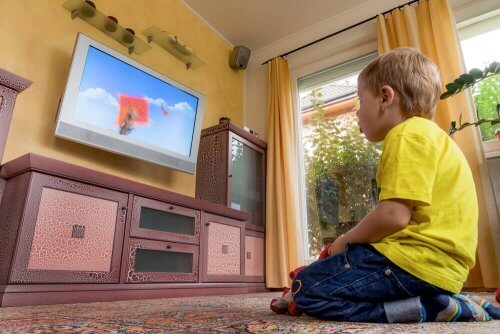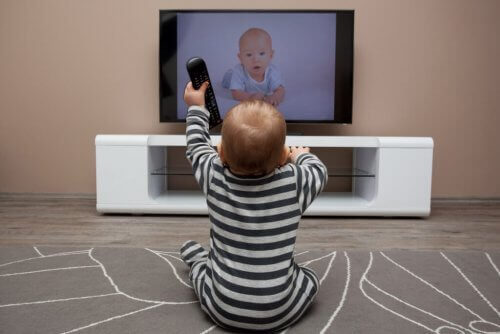Is It Good for Children to Watch Too Much TV?

Parents constantly complain about their children being glued to the TV for hours on end. But is that a cause for concern? Is it good for children to watch a lot of TV?
A child’s development involves motor skills and interaction with objects and human beings. However, when children are watching their favorite show or series, they exhibit passive attitudes. They’re also preoccupied by the images that appear on the screen.
TV can be responsible for the delay of psychomotor development, the decrease in attention span, and anxiety. On the contrary, it can also be an extraordinary means of entertainment and education, provided that it’s presented at the right time and in ideal situations.
For very young children, watching TV is considered one of their favorite hobbies. Unfortunately, they spend much more time watching TV than engaging in other types of cultural or leisurely activities and sports.
What is the recommended time for watching TV?
Pediatricians recommend these guidelines for the amount of time children spend in front of the screen:
- Babies and small children up to 18 months: Watching TV isn’t recommended.
- Young children from 18 to 24 months: Start with a few minutes per day.

- Preschool age: No more than one hour per day of educational programming, accompanied with a parent or other guardian who can help them understand what they’re watching.
- Children from 5 to 12 years old and adolescents from 13 to 18 years old: At these ages, parents must establish consistent limits on screen time, which includes TV, social networks, and video games.
Is it good for children to watch a lot of TV?
To grow and develop, children need to constantly interact with their environment. Whether it’s playing, drawing, or talking, these are activities that allow them to discover the world around them.
In fact, they need to live through all these experiences to assure excellent motor, emotional and intellectual development.
TV distracts children from doing these activities, which is why it’s not good for them to watch a lot of TV. It can interfere with learning and academic performance if it affects activities that are essential to children’s physical and mental development. Spending too much time watching TV leads to a decline in creativity and imagination.
In fact, studies show that, regardless of the content or educational value of what is being watched, spending a lot of time watching TV after school is increasingly considered as an independent risk factor for diseases.
“Parents can help reduce the harmful effects of TV by regulating the type of programming and limiting the amount of time a child spends in front of the screen.”
Why isn’t it good for children to watch too much TV?
Without a doubt, too much TV time can be negative. These are the reasons:
- Children who spend more than 4 hours a day watching television are more likely to be overweight .
- If children see violence on TV, they’re more likely to show aggressive behavior.
- TV characters often depict risk behaviors, such as smoking and drinking, and also reinforce gender roles and racial stereotypes.

Suggestions you should keep in mind
Parents can help reduce the harmful effects of TV by regulating the type of programming and limiting the amount of time a child spends in front of the screen. The following suggestions will help establish good habits for your children:
- Plan appropriate content for your children to watch – don’t turn the TV on at random.
- Limit TV use to 1 or 2 hours per day for children over 2 years old.
- Watch TV with your child and discuss what’s happening on the show.
- Turn off the TV if you think the program isn’t suitable for your children’s ages – many daytime programs aren’t.
- Be a good example for your children by not watching too much TV in front of them. Participate in other activities, especially reading.
- Encourage outdoor activities and exercise instead of watching TV.
- Limit TV use as a reward for good behavior.
- Don’t allow your children to watch TV while eating
In conclusion, it’s not good for children to watch a lot of TV. It distracts them from doing other activities that positively reinforce their personal development. However, when they do watch TV, show them how to analyze what they’ve watched in an intelligent manner.
Parents constantly complain about their children being glued to the TV for hours on end. But is that a cause for concern? Is it good for children to watch a lot of TV?
A child’s development involves motor skills and interaction with objects and human beings. However, when children are watching their favorite show or series, they exhibit passive attitudes. They’re also preoccupied by the images that appear on the screen.
TV can be responsible for the delay of psychomotor development, the decrease in attention span, and anxiety. On the contrary, it can also be an extraordinary means of entertainment and education, provided that it’s presented at the right time and in ideal situations.
For very young children, watching TV is considered one of their favorite hobbies. Unfortunately, they spend much more time watching TV than engaging in other types of cultural or leisurely activities and sports.
What is the recommended time for watching TV?
Pediatricians recommend these guidelines for the amount of time children spend in front of the screen:
- Babies and small children up to 18 months: Watching TV isn’t recommended.
- Young children from 18 to 24 months: Start with a few minutes per day.

- Preschool age: No more than one hour per day of educational programming, accompanied with a parent or other guardian who can help them understand what they’re watching.
- Children from 5 to 12 years old and adolescents from 13 to 18 years old: At these ages, parents must establish consistent limits on screen time, which includes TV, social networks, and video games.
Is it good for children to watch a lot of TV?
To grow and develop, children need to constantly interact with their environment. Whether it’s playing, drawing, or talking, these are activities that allow them to discover the world around them.
In fact, they need to live through all these experiences to assure excellent motor, emotional and intellectual development.
TV distracts children from doing these activities, which is why it’s not good for them to watch a lot of TV. It can interfere with learning and academic performance if it affects activities that are essential to children’s physical and mental development. Spending too much time watching TV leads to a decline in creativity and imagination.
In fact, studies show that, regardless of the content or educational value of what is being watched, spending a lot of time watching TV after school is increasingly considered as an independent risk factor for diseases.
“Parents can help reduce the harmful effects of TV by regulating the type of programming and limiting the amount of time a child spends in front of the screen.”
Why isn’t it good for children to watch too much TV?
Without a doubt, too much TV time can be negative. These are the reasons:
- Children who spend more than 4 hours a day watching television are more likely to be overweight .
- If children see violence on TV, they’re more likely to show aggressive behavior.
- TV characters often depict risk behaviors, such as smoking and drinking, and also reinforce gender roles and racial stereotypes.

Suggestions you should keep in mind
Parents can help reduce the harmful effects of TV by regulating the type of programming and limiting the amount of time a child spends in front of the screen. The following suggestions will help establish good habits for your children:
- Plan appropriate content for your children to watch – don’t turn the TV on at random.
- Limit TV use to 1 or 2 hours per day for children over 2 years old.
- Watch TV with your child and discuss what’s happening on the show.
- Turn off the TV if you think the program isn’t suitable for your children’s ages – many daytime programs aren’t.
- Be a good example for your children by not watching too much TV in front of them. Participate in other activities, especially reading.
- Encourage outdoor activities and exercise instead of watching TV.
- Limit TV use as a reward for good behavior.
- Don’t allow your children to watch TV while eating
In conclusion, it’s not good for children to watch a lot of TV. It distracts them from doing other activities that positively reinforce their personal development. However, when they do watch TV, show them how to analyze what they’ve watched in an intelligent manner.
All cited sources were thoroughly reviewed by our team to ensure their quality, reliability, currency, and validity. The bibliography of this article was considered reliable and of academic or scientific accuracy.
- Ladeveze, L. N., & Ornia, J. R. P. (2006). La audiencia infantil en España: cómo ven los niños la televisión. Telos: Cuadernos de comunicación e innovación, (66), 105-116. https://dialnet.unirioja.es/servlet/articulo?codigo=1976622
- Perlado, L., Luisa, M., EKMAN, R. B. L. P., & La, M. L. S. G. (2003). LA INFLUENCIA DE LA TELEVISIÓN EN LOS NIÑOS Children’s televisión: Analysis ofeffects L’influence de la televisión dans les enfants. Enseñanza, 21, 163-178. http://e-spacio.uned.es/fez/eserv.php?pid=bibliuned:20332&dsID=influencia_television.pdf&a=bi&pagenumber=1&w=100
- Gallego, J. C. (2004). Limitaciones para el establecimiento de una tipología de la investigación sobre niños y televisión: el caso español. Empiria. Revista de metodología de ciencias sociales, (8), 11-54. http://revistas.uned.es/index.php/empiria/article/view/978
- Reyes-Gómez, U., Sánchez-Chávez, N. P., Reyes-Hernández, U., Reyes-Hernández, D., & Carbajal-Rodríguez, L. (2006). La Televisión y los Niños: II Obesidad. Boletín Clínico Hospital Infantil del Estado de Sonora, 23(1), 25-30. https://www.medigraphic.com/cgi-bin/new/resumen.cgi?IDARTICULO=18911
This text is provided for informational purposes only and does not replace consultation with a professional. If in doubt, consult your specialist.








